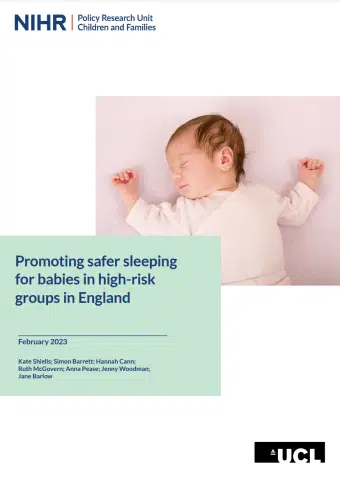13th March 2023
At the start of Safer Sleep Week 2023, a new report is published today on promoting safer sleeping for babies. Health visitors have an important role to play in promoting safer sleep and ensuring that these important messages reach all families.
Change is needed to the way safer sleep information is communicated, if risks to babies from unsafe sleeping practices are to be reduced, according to a new report from Oxford, UCL, Bristol and Newcastle Universities. This was prompted by government, in the wake of sudden death in infancy data, in an attempt to identify what type of support was needed to reduce the incidence in all families.
The new report on promoting safer sleep for babies particularly focuses on families facing significant adversity, who may be receiving support from Children’s Social Care Services. While rates of sudden unexpected death in infancy (SUDI) declined steeply in the 1990s and continued to decline until 2014, families living in the most deprived neighbourhoods continue to experience a disproportionately higher rate; the National Child Mortality Database found that 42% of SUDIs occurred in deprived neighbourhoods, compared with 8% in the least deprived.
Researchers interviewed parents, talked to local professional services and studied data on decision-making and safer sleep interventions.
According to the report, a range of motivational factors play a key role in influencing decision-making about the infant sleep environment, including parents’ own needs for adequate sleep, and the need to bond with their babies. Research also suggests professionals responsible for conversations about infant sleep safety have concerns about providing personalised and tailored support and managing risks in families with a social worker.
The researchers recommend:
- Open conversations between parents and professionals could be used to support safer sleep for babies who have a social worker.
- These open conversations would need to acknowledge and discuss the reality of people’s lives in order to understand and address the motivation behind parental decisions and actions.
- Conversations should include credible, trusted sources and sound evidence to explain how and why safer sleep practices aim to protect infants. Social pressures with regard to “good parenting” may act as barriers to open and frank conversations between parents and professionals.
The research finds in-depth conversations about safer sleep might best be delivered to families in receipt of social care by a practitioner, such as a Health Visitor, who can provide continuity of care and who has established a trusting relationship with them. Peer and family support networks are also important to reinforce messages and provide practical advice.
The report suggests professionals could engage parents to identify motivations and provide personalised support that is still consistent with national guidance, but that is based on the needs of individual families.
Such conversations need to be consistent with guidelines from NICE and The Lullaby Trust whilst also being sensitive to the needs and context of individual families. iHV supports the Safer Sleep campaign led by the Lullaby Trust which shines a spotlight on this important public health issue.



